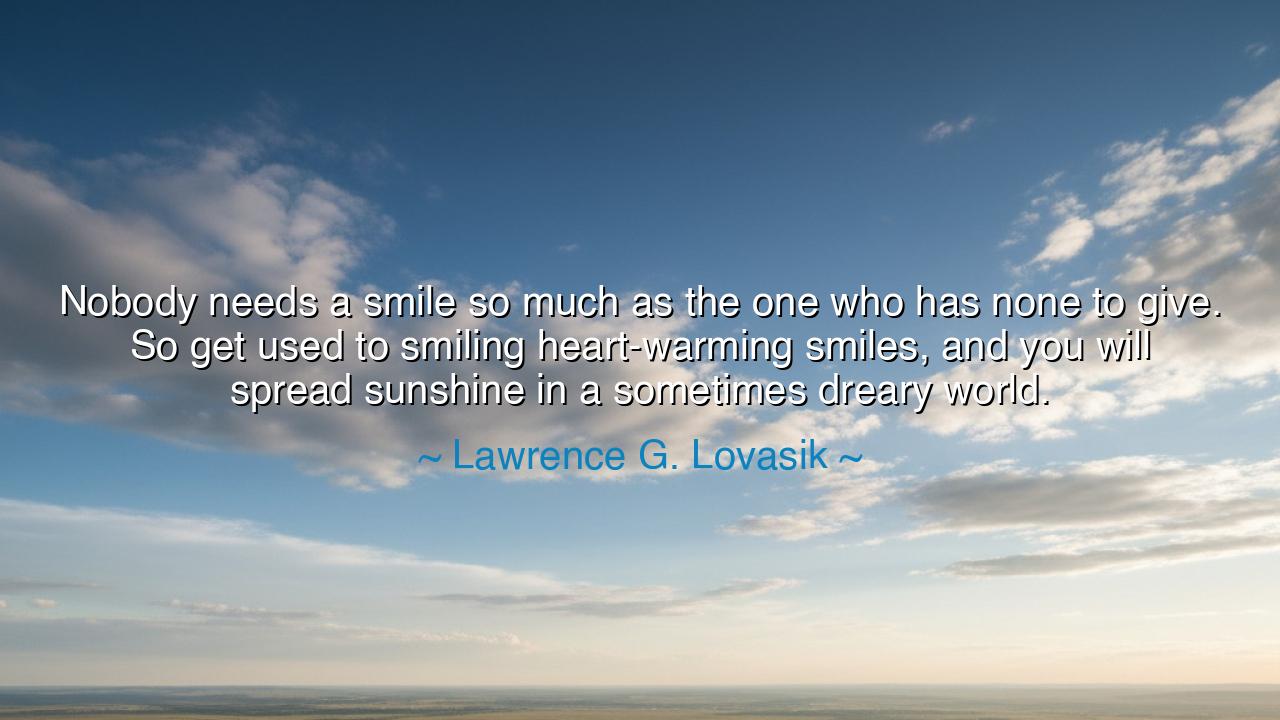
Nobody needs a smile so much as the one who has none to give. So
Nobody needs a smile so much as the one who has none to give. So get used to smiling heart-warming smiles, and you will spread sunshine in a sometimes dreary world.






The words of Lawrence G. Lovasik—“Nobody needs a smile so much as the one who has none to give. So get used to smiling heart-warming smiles, and you will spread sunshine in a sometimes dreary world.”—speak with the tone of a prophet reminding us of our duty to one another. They tell us that those who are unable to smile, those weighed down by sorrow, despair, or exhaustion, are the ones most in need of receiving the gift of a smile. And they warn us that the world, often heavy with shadows, can be healed not only by great deeds of power but by small acts of warmth—smiles that are sincere, radiant, and heart-warming.
The ancients would have understood this as the principle of compassion: to give where there is lack, to pour where the cup is empty. The one who cannot smile is not to be shunned, but to be lifted. For the smile is not merely a gesture of the lips, but a flame of the spirit, a light of the soul. When it is extinguished in someone, we who still carry it are called to share it freely. In this way, the burdened heart receives hope, and the dreary world is pierced by sunshine.
Consider the example of Florence Nightingale, the “Lady with the Lamp.” During the Crimean War, she walked the wards of suffering soldiers. Many of them lay in misery, broken in body and in spirit, with no strength to smile. Yet she carried a gentle countenance, a steady flame of kindness, and a face lit with hope. It was said that her presence alone eased pain. She gave the smile of compassion to those who had none, and in so doing, she rekindled their courage to endure. Her lamp lit the corridors of the hospital, but her smile lit the corridors of their souls.
The teaching of Lovasik also reminds us that smiling is not only a reaction to joy but a discipline of love. “Get used to smiling,” he says, for it must become a habit, a natural expression of the heart. Many wait until life is perfect to smile, but perfection never comes. Instead, we must practice smiling as an offering, even when our own burdens are heavy. In this practice, we do not deny suffering—we defy it. We declare that the light within us is stronger than the gloom around us.
And when we give such a smile, it multiplies. The one who receives it may pass it on to another, who passes it further still, until what began as a small act becomes a chain of warmth spanning the world. This is the meaning of “spreading sunshine.” Just as one candle can light a thousand without losing its flame, one smile can ignite countless others, and the dreariest world can be transformed into a place of hope.
But Lovasik’s words also carry a challenge. It is easy to smile at those who already smile at us, but the greater task is to smile at those who cannot return it. To smile at the weary cashier, the grieving neighbor, the stranger lost in despair—this is the true test of love. For here, the smile is not a transaction but a gift, given freely, expecting nothing in return. Such smiles are the noblest, for they are the smiles that heal.
The lesson, then, is clear: become a giver of smiles, not only when it is easy, but especially when it is needed most. Train yourself each day to carry a countenance of warmth. Begin with those nearest to you—your family, your friends. Then extend it to strangers, to those who look away, to those too burdened to smile back. Remember that your smile may be the only light they see that day. And in giving it, you yourself will be strengthened, for to shine upon others is to invite the sun into your own heart.
Thus, Lovasik’s teaching is eternal: “Nobody needs a smile so much as the one who has none to give.” Live by this, and you will become not only a source of joy but a bearer of light. Your smiles will ripple outward, breaking through gloom, softening sorrow, and leaving behind you a trail of sunshine. And when your own days grow dreary, you will find that the smiles you gave have returned to you a hundredfold, as a harvest of love from seeds once sown in kindness.






AAdministratorAdministrator
Welcome, honored guests. Please leave a comment, we will respond soon